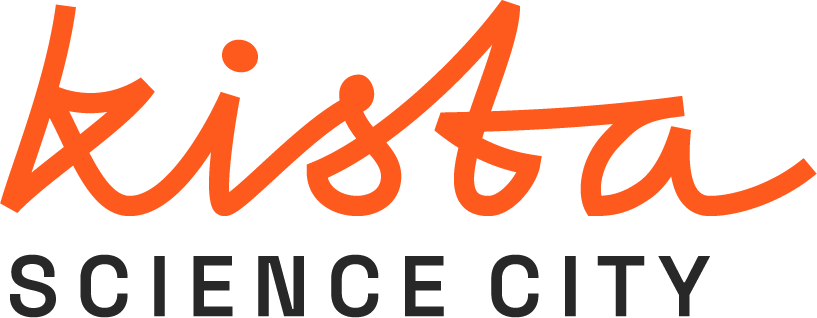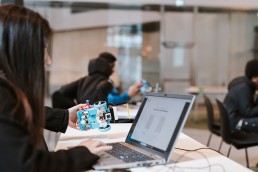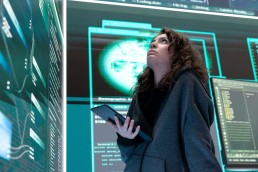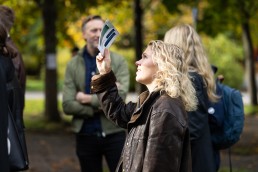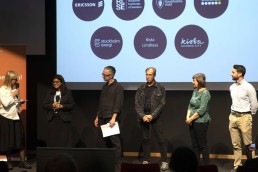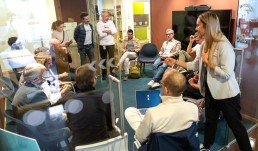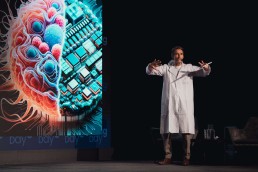A year of STEM collaboration: What we learned and what comes next
Clear role models, access to relevant networks and visible paths from school to working life can play a major role in whether young people continue developing their interest in STEM. In the district of Järva, that connection has been a central focus throughout 2025.
Schools, universities and local companies have worked together to strengthen the curiosity for technology, mathematics and engineering among young people aged 13–19. The collaboration has combined hands-on activities with opportunities for students to meet professionals in STEM and see what these careers look like in practice.
Alongside the practical work, Kista Science City, KTH, Stockholm University, Vetenskapens Hus and the City of Stockholm also conducted a pre-study mapping existing STEM initiatives in Järva. Through interviews with teachers and students, we gained a clearer view of where the ecosystem is strong and where additional structures are needed to support a more coherent path forward for young people.
Bringing STEM closer to students
During 2025, students in lower secondary school met researchers, engineers, developers and other professionals working in STEM. Among the organisations involved were Stockholm University and its Game lab in Kista, KTH, Vetenskapens Hus, Ericsson, IBM, Kodcentrum, Rejlers, Knightec, My Dream Now, Funki, Rookie Startups, Changers Hub and the Stockholm Science and Innovation School.
More than 400 students participated in activities ranging from workshops to school visits, giving them a chance to see how STEM is used in real settings.
One highlight was Tech Day in Kista, where 120 students from year 7 and 8 explored different aspects of technology and engineering. Afterwards, 50 percent said they could imagine working in a STEM field in the future, an increase of eight percentage points compared with before the event. As one student put it:
“When they showed us the cool things you can do with technology, I got excited. I realised I might be able to work with something like that in the future, which I hadn’t thought about before.”
Insights from 2025
Many initiatives, but limited coordination
The pre-study identified around 15 initiatives in Järva aimed at inspiring young people in STEM. Most of them focused on technology and some on mathematics through homework support. The range is wide, but the activities are not yet connected in a way that gives students a clear, continuous path forward. Schools, academia, civil society and industry all contribute, but stronger coordination is needed to bring these efforts together.
Limited access to role models and networks in Järva
Many young people have limited contact with professionals and established networks within STEM. While interest and ambition are often high, continued engagement depends on whether students meet people working in the fields they are curious about and gain insight into real study and career paths. Teachers highlight that this challenge affects many students, and that the lack of networks and visible role models — particularly women in STEM — shapes how young people imagine their future options.
Schools call for clearer progression and continuity in STEM education
Interviews with teachers and career counsellors highlighted the lack of structured STEM progression for students aged 13–16. Schools are asking for programmes, ideally developed together with industry and academia, that begin as early as year 7 and follow curriculum goals with clear steps forward. When students understand how their learning connects to further studies and career options, their motivation grows.
Looking ahead: building long-term STEM pathways
The insights from 2025 have created a clearer foundation for how schools, industry and academia can work together going forward. In 2026, the collaboration continues with the aim of developing more structured STEM pathways that give students continuity over time.
For companies and universities, this means staying close to the work taking place in schools and contributing with practical perspectives from their fields. Such involvement helps strengthen the link between what students learn in the classroom and the opportunities that exist beyond it.
The long-term ambition is to create conditions where more young people in Järva can pursue their interest in STEM and see possible routes into further studies and future careers.
Want to get involved?
We welcome companies and organisations interested in contributing to upcoming activities or supporting the development of STEM pathways in Järva.
Contact nellie.skeppstedt@kista.com to learn more.
—
The pre-study was funded by the European Social Fund (ESF).
Understanding online risks: Lisa Kaati’s research at DSV in Kista
Much of today’s public conversation takes place online, where the volume of posts, comments and messages grows every year. For analysts, schools and public authorities, this creates a practical challenge: harmful language, personal attacks and signals of escalating behaviour appear at a pace that makes manual review difficult.
At the Department of Computer and Systems Sciences (DSV) in Kista, researcher Lisa Kaati studies these environments. With a background in computer science and more than a decade at the Swedish Defence Research Agency (FOI), she develops methods that help analysts make sense of large text datasets and identify signals that are difficult to detect manually.
The research: toxic communication and early warning signals
Kaati’s work at FOI helped shape her current research direction. There, she and her colleagues developed tools to support analysts working with large amounts of online text. Working close to public authorities made one thing clear: while research prototypes can test new ideas, operational users need systems that are reliable, robust and well-tested. That experience continues to influence how she approaches her methods today.
At DSV, her research focuses on understanding online behaviour through data, divided into two main areas. One track focuses on toxic or harmful communication – language that targets a person rather than their arguments. In an interview with Universitetsläraren, Kaati explains:
“In political discussions, for example, there can be quite a harsh climate, but what we analyse is when people make personal attacks or talk about irrelevant things, such as derogatory comments about people’s intellectual capacity or appearance, when discussions should really be about the person’s work.”
The second track focuses on digital warning signs, signals that may indicate a heightened risk of violence. She continues:
“There, we don’t analyse toxic language but try to identify actual threats or someone describing a planned violent act. We also analyse psychological factors in individuals. Is this person expressing a perceived injustice?” She adds that when several warning signals appear together, the risk level increases and the material requires closer review by human experts.
This work is strongly interdisciplinary. Kaati collaborates with psychologists, criminologists and social scientists, while she develops the computational methods used to analyse large text collections. By building her own analytical models rather than relying solely on existing tools, she can tailor methods to the specific signals that analysts need to detect.
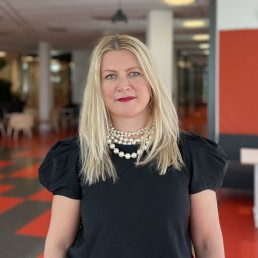
Practical applications and collaborations
Models based on Kaati’s research are now used primarily in the United States by schools and police departments. They help distinguish between harsh language and situations that may require follow-up — not by replacing human judgement, but by helping analysts prioritise which material needs closer review.
“It is not possible to sit and read everything that is written on the web. You need to sort through it. Computers can never replace people and their analytical skills, but we can help filter out what people need to read and understand,” Kaati says to Universitetsläraren.
Her methods also shape her teaching at DSV. The courses she has developed draw directly from her research and focus on online intelligence analysis and techniques for handling large volumes of digital text. As more work shifts into digital environments, these skills become increasingly relevant for future analysts.
International collaboration is another part of the work. During an exchange at Boston University, Kaati began a partnership with an American researcher specialising in threat assessment. Together, they analysed threatening online texts and worked with U.S. analysts to understand how risk levels are evaluated in practice. The collaboration has resulted in joint publications and involvement from the FBI’s Behavioral Analysis Unit, whose analysts contribute expert assessments to the research.
Digital safety in a changing landscape
Digital environments evolve quickly, and the volume of online material continues to rise. This makes it harder for organisations to recognise when everyday conversations begin to shift toward more concerning behaviour, especially when relevant signals may be scattered across large datasets.
In this context, analytical methods like those developed by Lisa Kaati give analysts a clearer starting point for their assessments. They highlight combinations of signals that might otherwise be overlooked and help ensure that potential risks are not lost in the speed and scale of online communication.
Kaati’s work focuses on parts of the internet that many prefer not to look at, but which can shape real risks and real consequences. By refining analytical tools and deepening insight into harmful online behaviour, her research contributes to a broader question: how societies can manage the risks that come with a more digital public life.
Further reading
“Lisa Kaati studerar allt som är dåligt med internet” (Universitetsläraren): A profile article about Kaati’s background, research approach and personal experiences with online harassment.
“Hon vill bara att tiden ska gå” (the Swedish Gender Equality Agency): A report that maps digital profiles and websites that market sexual acts for payment, co-authored by Kaati.
P4 Extra interview: Kaati discusses online discourse, vulnerable groups and her collaboration with analysts connected to the FBI.
Mind Intelligence Lab: A company founded by Kaati and colleagues at Uppsala University that develops research-based tools for identifying and assessing digital threats.
Light and logic strengthen Sweden’s defence capability
When Sweden’s photonics sector recently gathered in Kista for Optics & Photonics in Sweden (OPS), one theme dominated – defence. The conference demonstrated how light-based technology is rapidly becoming a cornerstone of Europe’s security capability.
Behind every drone, every satellite and every secure communication link, light is now becoming a strategic necessity. But what makes photonics so vital to modern defence, and what positions Sweden as a strong contributor?
The photonic advantage in modern defence
Photonics – the science of how light can be controlled and applied – makes it possible to create systems that are faster and more efficient than traditional electronics. When combined with semiconductor technology, information can be transmitted more quickly, with lower energy consumption and higher precision.
Concrete applications include infrared sensors and LiDAR systems that detect drones and missiles long before they appear on conventional radar. Optical communication links enable secure, interference-free data transfer, and in the future, quantum photonics will open the door to unbreakable encryption and even more advanced detection systems.
A Swedish ecosystem for innovation
In Sweden, a complete photonics ecosystem has emerged, bringing together research, innovative startups and international industry. Each category contributes to the nation’s technological sovereignty and defence readiness:
Sensor and Imaging Technology
- IRnova – Develops advanced infrared detectors extending the range and precision of surveillance and targeting systems across air, land and maritime domains.
- Teledyne FLIR – Delivers multispectral and thermal imaging systems for drone detection, target tracking and battlefield monitoring, enhancing situational awareness.
Semiconductor and photonic integration
- Mycronic – Provides world-leading photomask writers and die-bonding equipment used in the manufacturing of next-generation photonic and semiconductor chips, ensuring secure and traceable European production capacity.
- Silex Microsystems – Operates one of the world’s most advanced MEMS foundries, producing miniaturised sensors and actuators critical for navigation, guidance and environmental sensing in modern defence systems.
Laser and optical systems
- Lumibird Photonics Sweden – Supplies high-performance laser rangefinders and designators for naval, airborne and ground applications, contributing to precision targeting and autonomous systems.
Together, these companies, along with coordinative initiatives like Semiconductor Arena in Kista Science City, form the basis of a national value chain where research becomes production – and production becomes operational capability.
From policy to capability
Transforming innovation into defence capability requires coordination. Photonics, as the optical backbone of next-generation chips, represents the intersection where Sweden’s strengths in defence innovation meet Europe’s semiconductor ambitions.
“Over the past year, we’ve noticed a clear increase in openness and curiosity from both defence organisations and their industrial partners. It’s not just about scouting new technology anymore – it’s about understanding what Swedish deep-tech companies can bring to the next generation of systems,” says Peter Tiberg, Chief Product & Commercial Officer at Polar Light Technologies, a Swedish startup at the forefront of MicroLED development. “For us, this means focusing on building trust through transparency, reliable delivery, and long-term commitment rather than quick pivots.”
Within the framework of the EU Chips Act and a broader ambition for strategic autonomy, Sweden contributes its expertise to the shared defence goals of the EU and NATO. Standardisation and cooperation strengthen interoperability, allowing allied systems to share both materiel and data.
Sweden’s Minister for Defence, Pål Jonsson, has emphasised the strategic link between semiconductors and national security. At the core of this lies Europe’s common need for technological sovereignty – and to secure knowledge and production capacity within the Union’s borders.
The time is now
A global race is underway, as nations invest heavily in semiconductors and emerging technologies such as photonics. Sweden is uniquely positioned, with expertise across the entire value chain – from laboratories and test facilities to companies that have advanced optical science for decades.
“Right now, enormous amounts of money are being poured into the market,” says Raoul Stubbe, Deep Tech Business Coach and Co-founder at Sting. “It creates opportunities for new actors to take their place. But once the funds are locked into long-term projects in Sweden and NATO, the window for new initiatives will close.”
The Swedish ecosystem already has all the pieces in place to succeed in combining light (photonics) with logic (semiconductors) and defence. The next step is increased coordination between actors at all levels throughout the chain, from research and production, and ultimately military capability. To secure a strong position, we need the determination to act together – before others do.
Do you want to get involved? Reach out to hanna.eldh@kista.com
–
Semiconductor Arena is co-funded by the European Union and Region Stockholm, and is run by Kista Science City, KTH, RISE and Sting.
Wittra Networks boosts cybersecurity readiness through support from Sweden Secure Tech Hub and eBuilder Security
Wittra Networks has strengthened its cybersecurity framework to meet rising regulatory demands and prepare for ISO 27001 certification. Through support from Sweden Secure Tech Hub, the company collaborated with eBuilder Security to carry out a penetration test and reinforce internal practices.
“The support we received made a clear difference — not just for the certification process, but for strengthening confidence in our daily cybersecurity work, both internally and among customers,” says Johan Kullander, Senior Business Development Manager at Wittra Networks, a subsidiary of Nida Tech Sweden.
Connecting expertise with real needs
Wittra Networks develops connected RTLS and sensor solutions that enable asset tracking and environmental monitoring in complex industrial settings. Its clients include organisations with high security requirements, such as Arlanda Airport — making information security and regulatory compliance central to how the company operates.
When preparing for ISO 27001 certification, Wittra Networks learned about the support available through Sweden Secure Tech Hub via Kista Science City. The hub connected the company with eBuilder Security, a Kista-based firm with more than 15 years of experience providing cybersecurity services to public and private organisations.
The collaboration focused on conducting a penetration test — a key step in meeting the requirements of ISO 27001 and the NIS2 directive. Over two weeks, eBuilder Security carried out a structured, five-phase assessment tailored to Wittra Networks’ specific systems and needs. The work provided detailed insights into system vulnerabilities and clear guidance for strengthening internal routines.
Beyond the immediate outcome, the project also helped Wittra Network expand its network of trusted cybersecurity partners — an important asset for companies operating in regulated and safety-critical environments.
Strengthening Sweden’s cybersecurity ecosystem
For many technology-driven SMEs, building strong cybersecurity has become just as essential as developing core products. As standards tighten and customer expectations rise, smaller companies often need to match the security level of much larger organisations — but without the same internal resources.
“Working with smaller companies allows us to bring cybersecurity practices closer to the people behind the systems,” says Per Häggdahl, Head of Business Unit & CISO at eBuilder Security. “When those insights reach across the organisation, cybersecurity becomes part of everyday operations rather than a separate exercise.”
By enabling collaborations like this one, Sweden Secure Tech Hub helps SMEs access targeted expertise, raise their security standards, and build resilience across Sweden’s digital economy.
_____
Interested in strengthening your company’s cybersecurity?
Contact sakarias.strand@kista.com to learn about ongoing initiatives and support.
Sweden Secure Tech Hub is a national innovation hub working to strengthen SMEs’ capacity in cybersecurity. It is co-funded by the European Union and run in collaboration between Kista Science City, Blue Science Park, Linköping Science Park, Luleå Science Park, Ideon Science Park and Lindholmen Science Park.
Integrating drones into city life: Stockholm takes next step
The Swedish capital is taking another step toward integrating autonomous systems into city life. In October, the City of Stockholm tested a “drone-in-a-box” system on the roof of Farsta swimming hall — the first time a large-scale station of this kind has been used in a Swedish city environment.
The demonstration was part of CITYAM, an EU-funded project that helps European cities explore how drones can support public services. For Stockholm, the aim was to understand what it actually takes to operate such a system safely in a dense urban setting — from regulations and permits to coordination on the ground. The test marks a shift from technical demonstration to operational learning, showing how large cities can integrate drone technology into existing infrastructure and operations.
“Projects like this help cities move from concept to practice,” says Karolina Pamp, Project Manager Mobility at Kista Science City. “They show how new technology can fit into daily routines rather than remain on the drawing board.”
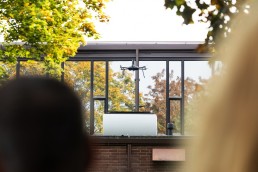
Putting autonomy to the test
The drone-in-a-box system, supplied by Nokia, allows a drone to take off and land automatically from a fixed station that also stores and charges the aircraft. A remote pilot and visual observers were part of the crew on site to ensure regulatory compliance and safety. In time, the goal is to manage these flights remotely — a change that could make operations more scalable and cost-effective than having a pilot for every mission.
Unlike trials carried out in controlled areas, the Farsta test took place in an active neighbourhood, surrounded by people and traffic. It offered a glimpse of how autonomous systems perform when they meet the pace of real city life — and what that means for future use. Over time, such systems could support city operations ranging from infrastructure inspections to environmental monitoring and emergency response.
Coordination on the ground
Before the test, the practicalities had to line up. Rooftop access had to be secured, electrical installation completed, safety procedures reviewed and communication with the local community established. Residents were informed in advance so people knew what was happening and why.
Each step tested the same issue many cities now face: how to introduce new technology within existing systems and responsibilities — a process that depends as much on people as on hardware.
“True integration comes from collaboration and public awareness, not distance flown in kilometres,” says Isabelle Nyroth, technical advisor at Kista Science City. “What we saw in Farsta was that principle in action — different actors working together to take steps toward making drone operations part of everyday city life.”
Next steps
The outcomes from the Farsta trial are now being analysed to support Stockholm’s continued work on drone integration. This includes refining procedures and safety routines, and clarifying how different departments and partners can collaborate around new technologies.
By sharing the results openly, the project helps other cities and organisations build on what has been learned — bringing drone-based services one step closer to becoming a safe and trusted part of everyday urban life.
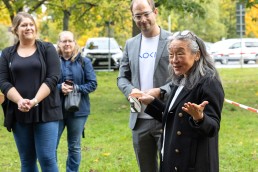
____
CITYAM is an EU-funded project supporting European cities in preparing for the safe and responsible use of drones in urban environments. The Stockholm pilot was delivered by Kista Science City together with the City of Stockholm, Nokia and project partners.
For more information, contact karolina.pamp@kista.com
Digital twins in practice: Lessons from Digital Vision Kista
How do we create alignment and shared visions in multidisciplinary projects — and truly understand how others are affected? The answer often lies in the mix of perspectives. When researchers, city planners and companies work side by side, tools that might otherwise remain abstract become solutions that guide real decisions.
That was the starting point for Digital Vision Kista, a three-year initiative that explored how digital twins can support data-driven cooperation and decision-making across city organisations. By visualising complex systems and connecting different data sources, the project aimed to help stakeholders look beyond their own organisational scope and engage in discussions with others.
The method
Digital Vision Kista was part of the national Smart Built Environment programme, which supports digital transformation and innovation in urban development. The project followed the Triple Helix model — bringing together the public sector, industry and academia to combine their expertise. Partners included the City of Stockholm, RISE, Ericsson, Kista Science City, Kista Limitless, Stockholm Exergi and S:t Erik Kommunikation, together with universities and students.
Unlike many initiatives, Digital Vision Kista began not with a technical solution, but with the people and processes it aimed to support. The project was built around the idea of the digital twin as a collaboration tool — a way to build shared understanding and enable data-driven dialogue between departments and organisations. By starting from everyday work and existing tasks, the project could explore how a digital twin might genuinely help colleagues coordinate decisions in their daily operations.
This setup made it possible to combine technical expertise with real-world needs. As a result, the work could move forward in ways that were meaningful for both those developing the technology and those applying it in practice — from city departments to utilities and emergency services.
The process
The project started by identifying concrete needs and challenges through workshops and interviews. From these insights, the project defined a set of user journeys — examples of how digital twins could create value in everyday work.
To explore these user journeys in practice, an interactive 5D model of Kista was developed. The model brought together data on traffic flows, stormwater and energy use, making it possible to visualise how areas changed over time — from ongoing projects to planned developments — and to explore alternative scenarios for how the district could evolve in the future. By combining real datasets in one visual platform, it offered a shared reference point for dialogue and decision-making, helping different actors coordinate earlier in the process. The platform evolved iteratively as new needs were identified, gradually forming an early prototype for future collaboration and data-driven decision-making.
Building on this foundation, the project focused on eight main user journeys that could demonstrate the practical value of digital twins. Examples include coordinating underground infrastructure projects, simulating energy use in new housing areas, analysing urban resource flows (Reflow), supporting emergency services and creating safer, more attractive public spaces. A series of articles describing these user journeys in more detail is being published at digivis.se and smartbuilt.se.
“For many people, the single biggest use case is simply getting a shared picture of what’s happening in their area,” says Uwe Stephan, project manager at the City of Stockholm. “They want to know what the city has planned for nearby streets and public spaces, what other projects are underway close by, and how longer-term plans might affect them. Whether you work in a city department or a private company, having that shared picture makes it easier to coordinate and act at the right time.”
The ecosystem
Digital Vision Kista drew on the full strength of Kista’s innovation environment. Data from an intelligent traffic management testbed was integrated into the models, while collaborations with universities gave students the opportunity to experiment with live digital twin environments. This setup allowed research pilots, industrial projects and testbeds to intersect, creating synergies that would not have been possible in isolation.
One insight from the project was how prototype development can spark engagement even beyond the immediate partners. For example, a parking optimisation pilot at Ericsson attracted interest from stakeholders outside the project, highlighting the value of sharing progress openly and inviting others into the process. This kind of transparency helps build trust, social acceptance and broader participation.
By linking education, research and applied projects, Digital Vision Kista showed how an ecosystem approach can turn separate initiatives into shared progress.
Next steps
Although Digital Vision Kista has ended, the collaborations continue. New partners and funding are being sought to expand the work and carry the user journeys forward.
Building on what has been achieved, the next phase will focus on strengthening data-driven decision-making in complex urban environments. Through continued prototyping and testing, the partners aim to explore real challenges more deeply, align perspectives across organisational boundaries, and turn shared insight into practical progress.
“We now want to bring the results back into Stockholm’s work and scale up what fits our way of operating,” says Uwe Stephan. “That also means continuing to build together — data-driven transformation isn’t something any single organisation can achieve alone.”
For those involved, the value lies not only in what has been built, but in how it was built: through many disciplines meeting around the same table. That is how complex technologies move from concept to real-world use — and why projects like this matter for the future of our cities.
To learn more or explore potential collaborations, contact lucas.uhlen@kista.com.
Setting the agenda: Semiconductor Arena launches in Kista
Sweden’s semiconductor ecosystem now has a shared platform in Kista. Semiconductor Arena brings startups, industry and researchers together to develop skills, support companies and strengthen Sweden’s role in Europe’s semiconductor landscape.
The race for semiconductor sovereignty
Semiconductors power almost every modern system — from transport and energy to communication and health. As demand grows, Europe is investing heavily to reduce its dependence on external suppliers and secure local capacity.
Sweden has key strengths to build on: world-class research, advanced infrastructure and a strong base of specialist companies driving innovation. The challenge is to turn that technical know-how into industrial capacity, and to ensure Sweden plays a clearer role in Europe’s semiconductor future.
Semiconductor Arena
The launch of Semiconductor Arena marks a new phase for Sweden’s chip sector, bringing startups, industry and researchers closer together.
The Arena, developed by Kista Science City, KTH, RISE and Sting, is a neutral meeting ground where ideas can move beyond individual organisations and into shared initiatives. Here, companies and researchers from different fields can test ideas, share expertise and move projects forward together. By connecting strengths across the ecosystem, the Arena shortens the path from research to industrial impact and builds the networks and visibility that help companies grow.
The launch in Kista highlighted three priorities that will shape this work: attracting and training more talent, enabling companies to scale in Sweden and connecting regional strengths with both Sweden’s national strategy and Europe’s semiconductor agenda.
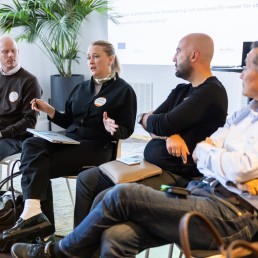
Building Sweden’s talent pipeline
The skills gap is one of the semiconductor sector’s most pressing challenges. Established companies point to an urgent need for more engineers and stronger incentives to enter the field.
“One concrete action is to reach engineers earlier in their academic journey so they see Sweden — and Stockholm in particular — as a strong hub with real career paths,” says Niklas Svedin, CTO and co-founder of Silex Microsystems, one of Sweden’s leading semiconductor companies.
Startups share the concern but see a different missing link: the difficulty of giving students and researchers clear entry points into real projects. “The most urgent need is structured competence initiatives that make it easier for students and researchers to engage with industry,” adds Louise Ribrant, VP of Business Development at Myvox, a startup specialising in MEMS ultrasound technology.
Semiconductor Arena is set up to address these needs, from early visibility to practical entry points. In the months ahead, the Arena will roll out initiatives to connect students with companies — starting with a thesis fair. Alongside this, the Electrum Lab will be made more accessible as a shared national resource, giving innovators hands-on access to state-of-the-art equipment.
Beyond engineers, companies also stress the importance of technicians and vocational roles to support large-scale production. To meet this need, the Arena will introduce new vocational training offers, preparing more people for hands-on roles in production.
Creating conditions for growth
Alongside the need for talent, another challenge for Swedish semiconductor companies lies in scaling their business. Moving from a small team to an established company is difficult. Development cycles are long and capital needs are high — and with limited financing options in Sweden, promising startups are too often acquired abroad, taking both competence and value with them.
Semiconductor Arena lowers these barriers by helping companies access infrastructure, connect with investors and build stronger ties across industry and academia.
One example of this approach is Sting’s Test Drive programme, which now includes a dedicated track within Semiconductor Arena to support researchers and startups. Test Drive is a short, workshop-based format that helps teams explore whether an idea can become a company. Concepts are tested with investors and mentors, giving them early clarity, confidence and networks.
“Being part of Semiconductor Arena connects us to a stronger innovation ecosystem at a critical time for both Sweden and Europe,” says Louise Ribrant of Myvox. “The Arena is a way to access competence, infrastructure and partners that can help accelerate development and commercialisation.”
Turning regional strengths into national influence
Sweden’s semiconductor sector has expanded quickly in recent years. Strong research environments, new startups and regional hubs are all contributing to a broader and more dynamic ecosystem. Yet much of this growth has developed in parallel, with initiatives often moving forward without alignment. Without stronger coordination, these efforts risk fragmenting — weakening Sweden’s ability to influence Europe’s semiconductor agenda and build long-term resilience.
Semiconductor Arena makes coordination day-to-day practice. Firmly rooted in Stockholm’s ecosystem, it gives local companies and researchers greater visibility by mapping actors and capabilities, showing who does what and where. By highlighting Stockholm’s semiconductor strengths, the Arena also makes it clearer what the ecosystem can contribute to Sweden’s national strategy and Europe’s semiconductor agenda.
Ultimately, coordination is about positioning — ensuring Sweden is not just part of Europe’s semiconductor agenda but able to shape it. As Niklas Svedin notes, self-sufficiency has become a central issue in Europe, making it urgent to put the semiconductor industry firmly on Sweden’s agenda. “The Arena helps connect industry, academia and policymakers — creating a stronger collective voice,” he says.
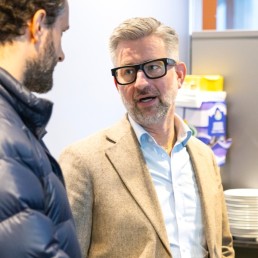
Looking ahead
Semiconductor Arena has brought Sweden’s chip sector into closer dialogue, turning collaboration into a working method rather than an exception. The next phase will build on this momentum: translating shared priorities into concrete initiatives — from clearer student pathways to new international connections.
The direction will be set by the ecosystem itself. As new needs emerge — whether in training, infrastructure or policy dialogue — the Arena provides a place to meet them collectively. Anchored in Stockholm and connected to national and EU strategies, it offers Sweden a stronger platform to act collectively in the global chip race.
Do you want to get involved? Reach out to hanna.eldh@kista.com
—
Semiconductor Arena is co-funded by the European Union and Region Stockholm and is run by Kista Science City, KTH, RISE and Sting.
Made in Kista: AI on Swedish terms
Updated December 2025
Made in Kista: AI on Swedish terms
Artificial intelligence is moving beyond clever applications and into the systems that run our societies. As it becomes embedded in healthcare, finance and education, a central question emerges: where does the technology run, and who controls the data behind it?
For Europe, and for Sweden, the answer is increasingly about AI sovereignty. The EU’s new AI Act is raising the bar for security and accountability, while organisations also want reassurance that sensitive data stays within national borders. Together, these demands are accelerating the push for secure, local solutions. In Kista, that shift is visible with new facilities and projects underway.
Secure AI in Kista
This summer, 6G AI Sweden launched a sovereign AI cloud at atNorth’s data centre in Kista. Built on NVIDIA’s reference architecture and powered by H200 GPUs, the facility gives Swedish organisations access to advanced AI capacity within national borders. The operation complies fully with GDPR and the AI Act, and runs entirely on renewable energy, with surplus heat recycled into Stockholm’s district heating grid. With a multi-billion-SEK hardware investment, the project demonstrates long-term commitment and offers a local alternative to foreign-controlled infrastructure.
The need for such alternatives is increasing. Even when data is stored on servers in Sweden, it can fall under foreign legislation if the provider is headquartered abroad. The US Cloud Act is one example, allowing American authorities to request data from US-owned companies regardless of where their servers are located. In an uncertain geopolitical environment, this legal distinction has become central for public institutions and regulated sectors working with sensitive information.
This is the challenge 6G AI Sweden aims to address. As a Swedish-owned provider operating on Swedish territory, the company gives organisations a way to run sensitive or regulated AI workloads in an environment aligned with domestic and EU legislation. The investment in high-performance compute also reflects a broader shift: the need to build capability across the AI stack, from physical infrastructure to the services and applications built on it.
However, the move toward sovereign AI is not about cutting ties with global cloud providers. Large global cloud providers (hyperscalers) will remain essential, and Sweden has no realistic path to replacing them at scale. What matters is having secure domestic options for information that requires stronger protection. For most organisations, this points to a hybrid future where sensitive workloads run locally while other operations remain on international platforms.
Another company, Berget AI, has opened Sweden’s first fully Swedish-owned AI infrastructure and inference service. The facility, also located in Kista, is designed to ensure that no data leaves the country, offering a way for organisations to avoid exposure to foreign legislation. Within months of launch, Berget AI was trusted by Riksbanken with sensitive workloads — a clear signal that their services meet the needs of Sweden’s most security-conscious institutions.
Taken together, these investments underline that Sweden’s sovereign AI capacity is no longer a vision but a resource being built in practice.
From ambition to adoption
Europe’s reliance on non-European infrastructure has long been viewed as a vulnerability, limiting control over both security and data. The AI Act is designed to change that, setting clearer standards for traceability, risk management and accountability. For Swedish organisations, the challenge is now less about knowledge and ambition, and more about moving from isolated pilots to large-scale use on platforms that meet these requirements.
This is where domestic infrastructure becomes crucial. Local providers anchored in Swedish and European legislation lower the threshold for public institutions and regulated sectors to deploy AI responsibly. They offer an environment where security, jurisdiction and compliance are built in from the start.
Sweden is well positioned to build and maintain this capacity over time. Low-cost electricity and a cold climate lower operating costs for energy-intensive AI workloads. Combined with stable national governance and a mature innovation ecosystem, these factors create strong conditions for long-term investment in domestic AI infrastructure.
By expanding sovereign infrastructure and anchoring capability locally, Sweden can move from early experimentation to broad adoption in ways that ensure trust, competitiveness and resilience. The capacity now being built in Kista is one example of how this transition is taking shape, giving Sweden the opportunity to develop and deploy AI on its own terms.
Eight Swedish scaleups head to Munich for Access Germany
The internationalisation of Swedish innovation continues. This week, we bring eight scaleups to Munich for Access Germany — a market entry programme organised by Kista Science City and the German-Swedish Chamber of Commerce.
From 29 September to 1 October, these companies will meet potential customers, investors and industry leaders, and gain insight into one of Europe’s largest and most innovative tech ecosystems.
Meet the companies
The selected scaleups represent sectors ranging from climate tech and automotive software to advanced materials.
We welcome:
- Remotive Labs: Helps automotive teams build, test, and iterate vehicle software at speed.
- Manomotion: Enables machines and devices to be controlled using simple hand movements.
- Nobula 3D: Develops the world’s first affordable 3D printer for glass.
- Cellufy: Offers a sustainable, bio-based alternative to plastic for packaging and products.
- Mediaflow: A platform that helps teams securely manage and share digital content.
- MyVox: MEMS technology transforming how sound and active cooling are integrated in compact electronics.
- NitroCapt: Produces fossil-free nitrogen to make fertilizers climate neutral.
- Smartport: Turns parking areas into smart energy hubs with solar, storage and EV charging.
Access Germany: Tailored market entry
The programme is designed to help fast-scaling deep tech, hardware and B2B businesses shorten the path to international growth.
This week, the delegation travels to Munich for three days of meetings, workshops and networking. Scheduled back-to-back with Bitz & Pretzels, a major European startup gathering, the visit creates opportunities to connect with the wider innovation community while focusing on targeted customer and investor engagements.
Throughout the programme, the companies will receive:
- Exclusive meetings with customers, partners and investors
- Insights into navigating the German business landscape
- Workshops to refine messaging and market positioning
“Breaking into new markets is rarely about technology alone,” says Arash Sangari, Programme Manager at Kista Science City. “It’s about being able to explain your value, build trust quickly and meet the right people at the right time. Access Germany is designed to give companies that platform — compressing months of effort into a few intensive days.”
Upcoming programmes
Later this autumn, applications will open for the 2026 Access programmes, targeting the US, Canada, UK and Germany.
Interested in joining future programmes? Contact arash.sangari@kista.com.
—
Access Germany is organised by Kista Science City and the German-Swedish Chamber of Commerce, with funding from the European Union and Region Stockholm.
New paths for Swedish research: Test Drive shows the way
Sweden has a strong tradition of research. This is reflected in the quality of its universities and institutes, and it underpins the country’s reputation for innovation. Yet many ideas still stall in the early stages, left on the shelf before they can be developed into companies. The reasons are rarely about scientific quality; they are about what comes next.
Traditional models — from licensing agreements to longer incubator tracks — play an important role, but they don’t always reach researchers at the point where ideas are just beginning to take shape. Turning research into resilient businesses requires access to infrastructure, early business development and connections to industry. Without those building blocks, promising results risk getting stuck before they reach the market.
That is where new approaches are needed: formats that combine technical insight with business perspective and give early teams the confidence and networks to move forward. One example of such a format is Test Drive, a programme developed and run by our sister organization Sting. During spring 2026 Sting will launch a Test Drive track within Semiconductor Arena, a national initiative to strengthen Sweden’s semiconductor ecosystem.
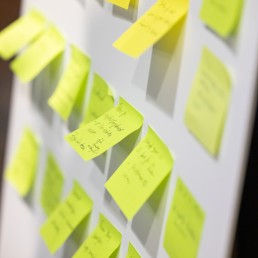
A first look at entrepreneurship
Test Drive is a short, workshop-based programme that lets researchers and innovators explore what it would mean to take an idea further. Over four to five sessions, teams bring their own ideas — often two or three people working together — and examine them through a startup lens: could they attract funding, what role would each person need to take, and what would it mean in practice to move forward? The programme ends with a pitch event, giving participants direct feedback from investors.
“We want to give researchers and innovators a picture of what this journey could look like,” says Raoul Stubbe, business coach at Sting. “What does it mean for me personally? What steps would I need to take for this to happen? That’s often what flips a switch — when participants start to think, ‘maybe this really could become something.’ We want people to leave with the feeling that they want their ideas to come out and make a difference in the world.”
Lessons from Test Drive
For many participants, the biggest gain is seeing their work from a completely different angle — one that stands in contrast to the priorities of an academic career. Raoul explains:
“In academia, publication and tenure often come first. Building a company isn’t something you can do on the side. It requires full focus and a different way of thinking. The programme doesn’t make the decision for them, but it shows what’s required — and often gives people the confidence to decide whether to take the leap.”
The outcomes reflect that. Around half of those who complete Test Drive go on to start a company — a high rate compared to other formats. Others choose not to, but highlight the investor feedback, exposure and new perspective as valuable in themselves. “Even if the company doesn’t become what you first imagined, the experience opens up opportunities and a new way of looking at what’s possible. That’s one of the biggest wins,” Raoul says.
Valentin Dubois is CEO and co-founder of Dappler Labs, a startup developing quality-control technology for semiconductor manufacturing. He took part in a Test Drive programme in 2023 and recalls:
“What Test Drive really taught us was how important it is to package an invention into something that can be sold. For academics, that’s not obvious at all. They pushed us to think in terms of a minimum viable product, and also how to pitch a highly technical idea in a way people outside our niche could understand.”
Bridging research and business
Test Drive doesn’t only affect individual decisions. It also reshapes how researchers relate to investors, and vice versa. Many enter the programme with fixed views: researchers seeing investors as focused only on sales, and investors doubting whether researchers can actually lead companies. In Test Drive, those assumptions are tested. By working side by side, participants begin to see the value in each other’s expertise. “It’s about creating respect for the strengths each side brings,” Raoul explains.
The shift can also extend to how researchers view themselves. Raoul points to a particular type of academic who could play a bigger role in bridging this gap — what he calls the entrepreneurial scientist:
“These are individuals who match the rigour of traditional science with the curiosity and drive needed to build companies. Test Drive helps them recognise that identity in themselves — quite often for the first time. The programme shows that entrepreneurial ambition is not at odds with academic credibility, but a way to amplify the impact of their work.”
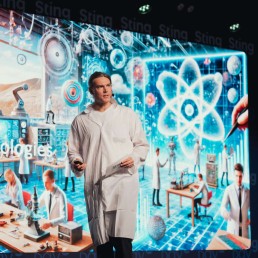
Moving forward
Test Drive is not a substitute for incubators, accelerators or licensing pathways. But it fills a crucial gap at the beginning of the journey, giving teams a structured first step that many existing models don’t provide. And it can be adapted. “These formats are portable,” Raoul Stubbe notes. “They can be tailored to new domains by adding the right pieces — access to infrastructure, industry mentors, a clear end goal. The principle is the same: help early teams see the path and take the first step.”
That adaptability has already been shown in dedicated tracks on health, energy and AI. The next step is deep tech and semiconductors. Within Semiconductor Arena, Sting will run a Test Drive track to help early-stage teams test and refine their ideas, and move them closer to implementation. With long development cycles and high capital needs, this is a field where early clarity is especially important for emerging teams.
Formats like Test Drive highlight a larger need in Sweden’s innovation system. The challenge is not producing strong research, but making sure it translates into companies and industries. Without that translation, the risk is not only missed growth, but dependency. As Raoul puts it: “This need is not new, but it is more urgent than ever today. Sweden measures up well against the US and China in research, but our weakness in transferring knowledge leaves us dependent on American and Chinese technology.”
Test Drive is one example of how that gap can be addressed. For Sweden, the task now is to make sure more such models take root — so that world-class ideas translate into the businesses, capabilities and resilience the country needs.
—
Semiconductor Arena is co-funded by the European Union and Region Stockholm, and is run by Kista Science City, KTH, RISE and Sting.
